Yellow cab doors
Vehicles painted in the short-lived early plain blue livery the yellow end wrapped around to include the cab doors.
More examples can be viewed on flickr.
1967

A Class 119 DMS in Swindon Works in the summer of 1967. Sadly the last digit of the W5108x number is obscured. Although the cab door is open its clear that it has been painted yellow, as have the wipers. Underneath the BIS box is in orange and the radiator in silver. David Faircloth.
Unknown date

A Class 100 / 101 hybrid. Both vehicles are in early variations of Rail Blue livery, the Gloucester has additional yellow as it includes the cab doors, the Met-Camm less yellow as it has just a small yellow panel (signified by the BR logo being on the cab door). Taken at Perth, date unknown. Stuart Rankin.
circa 1967

A Class 107 DMU stabled at Cowlairs, circa 1967. The DMCL has a wrap round yellow end to include the cab doors. The DMBS has the BR logo on the cab door and no sign of yellow on the side and so probably has just a small yellow panel on the front. Stuart Mackay Collection.
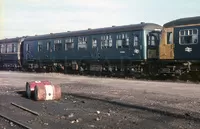
Cravens DMBS SC51484 in an early version of Rail Blue livery with a yellow panel, circa 1967. It is paired with original partner SC56473, still in green, with which it ran until at least 1973. On the right is Met-Camm DTCL SC56383, in another early version of Rail Blue livery, with yellow cab doors. Location unknown, all three vehicles were allocated to Hamilton depot at the time. Stuart Mackay Collection.
1967

A Derby Lightweight DMU (the DMBS with yellow cab doors) at Sandy thought to be of the 1257 arrival from Bletchley sometime in 1967. Roy Endersby.

A very rare picture of a Class 120 with yellow cab doors, seen at Swindon in summer '67. The first of the class in blue/grey, the paint date on the solebar reads 5/6/67, and the set number is also on the solebar - BL527. The other two vehicles in the set remained in green, W50650 (pictured) was possibly painted singly as a trial for approval before more of the class was done. David Faircloth.
28th December 1967
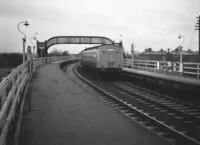
A hybrid DMU formed of a Met-Camm DTCL (with yellow cab doors) and a GRC&W DMBS is seen in Balgreen Halt station on the Corstorphine branch on 28 December 1967, just a few days before closure. Stuart Mackay Collection.
late 1960s
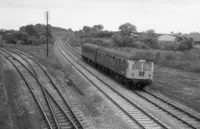
A Cravens DMBS / GRCW DTC hybrid approaches Haughley Junction on the Great Eastern Main Line. The yellow cab doors on the Cravens dates this to the late 1960s. Image by John Vaughan. Stuart Mackay Collection.
circa late 1960s

A two-car Class 101 50208 closest displaying Pwllheli on the destination blind approaches Barmouth. Date unknown, the yellow cab door suggests late 1960s. Stuart Mackay Collection.
26th February 1968
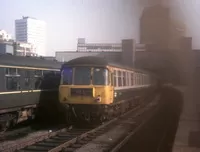
It looks like the photographer may have accidentally had his camera strap dangling in front of the lens, however a Trans-Pennine with yellow cab doors and the vehicle number at the opposite end from usual makes the image worth adding. Taken at Leeds City on 26 February 1968. Stuart Mackay Collection.
2nd March 1968
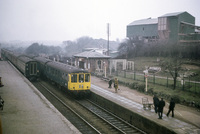
A BRC&W DMU at Nuneaton Abbey Street station on 2nd March 1968 looking toward Birmingham. The station was opened by the Midland Railway in 1864 and closed on 4th March 1968. Bryan Jeyes.
28th April 1968
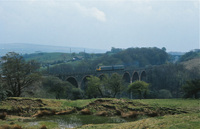
A Rolls-Royce powered Cravens unit with hydraulic transmission (later known as a Class 113) crosses Entwistle Viaduct on 28.4.68. The closest vehicle has yellow cab doors, the far vehicle has just a small yellow panel. George Woods.
18th May 1968
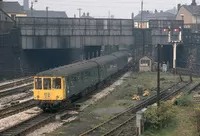
A BRC&W triple at Bolton, thought to be on 18 May 1968. Both power cars have yellow cab doors. Stuart Mackay Collection.
15th June 1968
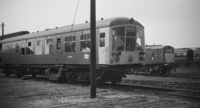
I visited Barrow on a Northern Railfans minibus trip to sheds in the northwest that left from Manchester Victoria - still pretty steamy then - on the Friday evening. This was my one and only real trainspotting foray. Disappointingly there were no steam engines remaining at Barrow in 1968 & I only took a couple of shots - this negative lay unprinted for years. I wish now that I had taken more photos around the shed but at least I did record the depot’s intermediate period when it mainly handled dmus. This Derby Lightweight unit M79134 has obviously been involved in a nasty knock with front buffer gone and cab windows smashed. New to Monument Lane in March 1956 & transferred to Carlisle Upperby in January 1968, the damage was considered too serious for repair and it was withdrawn in early June 1968. Pete LG99.
11th July 1968
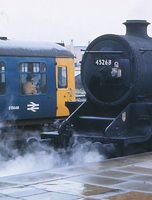
BRC&W 'Calder Valley' DMCL E51848 is seen with yellow cab doors at Morecambe station on 11 July 1968. George Woods.
21st July 1968
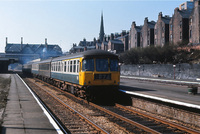
With alternate vehicles in blue/grey and green, a Trans-Pennine DMU is seen at Eccles on 21 July 1968. The DMC closest has yellow cab doors and the vehicle number unusually at the left end of the vehicle on this side. George Woods.
3rd August 1968
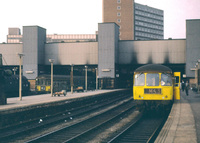
Trans-Pennine (E51960 closest, note the yellow cab door) and BRC&W DMUs in Leeds on 3 August 1968. David Mant.
Unknown date

A Class 101/101/107 set. The 107 DMBS (furthest, leading) is still in green, the 101 vehicles in blue, the closest has yellow cab doors. Seen at Law Junction, date unknown but circa 1969. Stuart Rankin.
circa 1969

BRC&W units in Manchester Victoria circa 1969. The two visible power cars have the smaller 3" numbers, the closest has yellow cab doors. John Law.
late 1960s

A three-car Met-Camm DMU in Thornton Junction station, DMBS Sc51470 closest with yellow cab doors. Taken in the late 1960s, Wikipedia notes the station closed on 6 October 1969. Graham Clark.
circa 1969
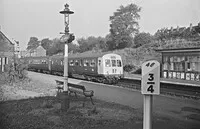
Call me a Yellow Cab! This pleasant view of Kings Norton station, circa 1969, has a good view of the WH Smith newspaper stall, a gas lamp and a milepost. And a class 101 with an all yellow cab - which is likely M50308. Image taken by Peter Shoesmith (pjs,1514). Geoff Dowling and John Whitehouse Collection.
8th February 1969
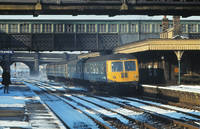
Two Cravens DMUs, one in blue and one in green, as Wood Green Station on 8 February 1969. The closest vehicle has yellow cab doors. George Woods.
10th March 1969
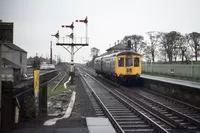
A Gloucester twin formed of 50345 (with yellow cab doors) and 56302 arrives into Prestonpans station on 10 May 1969. Bound for Edinburgh Waverley, presumably on a service from North Berwick, the driver has a couple of young guests in the cab with him. Stuart Mackay Collection.
April 1969

A class 116 has just arrived at Stratford-Upon-Avon from Birmingham Moor Street in April 1969. Note that the DMBS has yellow cab doors. Stephen Burdett.
19th April 1969
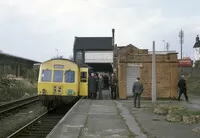
The RCTS Forester railtour at Rugby Central on 19 April 1969. This was their 200th tour, and closest is M50338 with yellow cab doors. Stuart Mackay Collection.
28th April 1969

Three-car Met-Camm set TY401 sits in Bordesley station with the 17:00 Birmingham Moor Street - Stratford-upon-Avon service on April 28, 1969. Note the yellow cab door on the closest vehicle. Stuart Mackay Collection.
1st June 1969
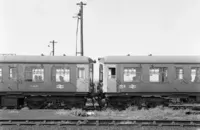
Withdrawn Derby Lightweight vehicles at Barrow on 1 June 1969. Both vehicles have yellow cab doors and damaged headstocks. DMBS M79012 on the left, with the top marker light hanging off, looks like it may also have damage to the cab corner on the far side. The DTCL on the right has split windscreens, and so is from a later batch than M79012. Stuart Mackay Collection.
16th August 1969
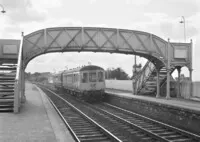
A mixed-livery Gloucester in Longniddry station with a North Berwick service on 16 August 1969. The DTCL has yellow cab doors. Stuart Mackay Collection.
Unknown date

A Cravens and Met-Camm set in Wolferton station with a Kings Lynn - Hunstanton service, probably in the late 1960s. The leading vehicle is in plain blue livery with yellow cab doors, it's partner is still in green. Steve Davies Collection.

A four-car formation sits in Hunstanton station, circa late 1960s. The two-car Met-Camm is in plain blue livery, the driver trailer having yellow cab doors. The two-car Cravens set behind has one vehicle in green and one in blue. Steve Davies Collection.

Cravens DMUs in the early Rail Blue era. The driver trailer (possibly E56431) has no sign that first class is on offer, no yellow stripe or transfers on the windows. It has yellow cab doors, the vehicle facing has another short-lived variation from this era, a small yellow panel. Date / location unknown. Graham Clark.
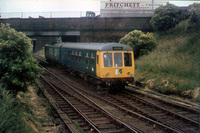
Looking clean and shiny in blue the 13:25 Southport to Lime Street passes Edge Lane Jcn signal box in the late 1960s. Edgehillsignallman@Flickr.


